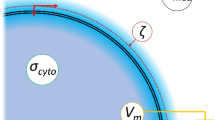Play all audios:

ABSTRACT CARBOCYANINE dyes are fluorescent probes of membrane potential in red cells1,2, and their application has been extended to Ehrlich ascites cells3,4 and phytoplankton5. I have used
them to study the effect of potassium concentration gradients on the membrane potential of resealed ghosts containing Ca buffers. Intracellular Ca specifically renders these ghosts highly
permeable to K (ref. 6). During this work, I discovered that 3,3′-dipropyl- and 3,3′-diethyl-thiadicarbocyanine iodide cause a progressive inhibition of K efflux at low external K
concentrations, and that external K protects against the inhibitory effects of the dyes. The results suggest that the carbocyanine dyes are specific inhibitors of the Ca-dependent K
transport system. Access through your institution Buy or subscribe This is a preview of subscription content, access via your institution ACCESS OPTIONS Access through your institution
Subscribe to this journal Receive 51 print issues and online access $199.00 per year only $3.90 per issue Learn more Buy this article * Purchase on SpringerLink * Instant access to full
article PDF Buy now Prices may be subject to local taxes which are calculated during checkout ADDITIONAL ACCESS OPTIONS: * Log in * Learn about institutional subscriptions * Read our FAQs *
Contact customer support SIMILAR CONTENT BEING VIEWED BY OTHERS CYTOPLASMIC ANION/CATION IMBALANCES APPLIED ACROSS THE MEMBRANE CAPACITANCE MAY FORM A SIGNIFICANT COMPONENT OF THE RESTING
MEMBRANE POTENTIAL OF RED BLOOD CELLS Article Open access 02 September 2022 STRUCTURE AND MECHANISM OF THE K+/H+ EXCHANGER KEFC Article Open access 04 June 2024 THE STRUCTURAL BASIS OF THE
PH-HOMEOSTASIS MEDIATED BY THE CL−/HCO3− EXCHANGER, AE2 Article Open access 31 March 2023 REFERENCES * Sims, P. J., Waggoner, A. S., Wang, C.-H., and Hoffman, J. F., _Biochemistry_, 13,
3315–3330 (1974). Article CAS Google Scholar * Hoffman, J. F., and Laris, P. C., _J. Physiol., Lond._, 239, 519–552 (1974). Article CAS Google Scholar * Philo, R. D., and Eddy, A. A.,
_Biochem. Soc. Trans._, 3, 904–906 (1975). Article CAS Google Scholar * Laris, P. C., Pershadsingh, H. A., and Johnstone, R. M., _Biochim. biophys. Acta_, 436, 475–488 (1976). Article
CAS Google Scholar * Adamich, M., Laris, P. C., and Sweeney, B. M., _Nature_, 261, 583–585 (1976). Article ADS CAS Google Scholar * Simons, T. J. B., _J. Physiol., Lond._, 256, 209–225
(1976). Article CAS Google Scholar * Simons, T. J. B., _J. Physiol., Lond._, 256, 227–244 (1976). Article CAS Google Scholar * Hladky, S. B., and Rink, T. J., _J. Physiol., Lond._,
258, 100PP–101P (1976). CAS PubMed Google Scholar * Riordan, J. R., and Passow, H., _Biochim. biophys. Acta_, 249, 601–605 (1971). Article CAS Google Scholar * Gardos, G.,
_Actaphysiol. hung._, 10, 185–189 (1956). CAS Google Scholar * Lew, V. L., _Biochim. biophys. Acta_, 233, 827–830 (1971). Article CAS Google Scholar * Meech, R. W., _J. Physiol.,
Lond._, 237, 259–277 (1974). Article CAS Google Scholar * Krnjevic, K., and Lisiewicz, A., _J. Physiol., Lond._, 255, 363–390 (1972). Article Google Scholar * Barrett, E. F., and
Barrett, J. N., _J. Physiol., Lond._, 255, 737–774 (1976). Article CAS Google Scholar Download references AUTHOR INFORMATION AUTHORS AND AFFILIATIONS * Department of Physiology,
University of London King's College, Strand, London, WC2R 2LS, UK T. J. B. SIMONS Authors * T. J. B. SIMONS View author publications You can also search for this author inPubMed Google
Scholar RIGHTS AND PERMISSIONS Reprints and permissions ABOUT THIS ARTICLE CITE THIS ARTICLE SIMONS, T. Carbocyanine dyes inhibit Ca-dependent K efflux from human red cell ghosts. _Nature_
264, 467–469 (1976). https://doi.org/10.1038/264467a0 Download citation * Received: 05 August 1976 * Accepted: 04 October 1976 * Issue Date: 02 December 1976 * DOI:
https://doi.org/10.1038/264467a0 SHARE THIS ARTICLE Anyone you share the following link with will be able to read this content: Get shareable link Sorry, a shareable link is not currently
available for this article. Copy to clipboard Provided by the Springer Nature SharedIt content-sharing initiative
